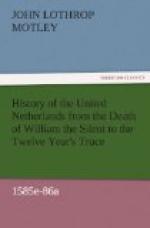Accordingly, no sooner had the bell-ringing, cannon-explosions, bonfires, and charades, come to an end, and the Earl got fairly housed in the Hague, than the States took the affair of government seriously in hand.
On the 9th January, Chancellor Leoninus and Paul Buys waited upon Davison, and requested a copy of the commission granted by the Queen to the Earl. The copy was refused, but the commission was read; by which it appeared that he had received absolute command over her Majesty’s forces in the Netherlands by land and sea, together with authority to send for all gentlemen and other personages out of England that he might think useful to him. On the 10th the States passed a resolution to offer him the governor-generalship over all the Provinces. On the same day another committee waited upon his “Excellency”—as the States chose to denominate the Earl, much to the subsequent wrath of the Queen—and made an appointment for the whole body to wait upon him the following morning.
Upon that day accordingly—New Year’s Day, by the English reckoning, 11th January by the New Style—the deputies of all the States at an early hour came to his lodgings, with much pomp, preceded by a herald and trumpeters. Leicester, not expecting them quite so soon, was in his dressing-room, getting ready for the solemn audience, when, somewhat to his dismay, a flourish of trumpets announced the arrival of the whole body in his principal hall of audience. Hastening his preparations as much as possible, he descended to that apartment, and was instantly saluted by a flourish of rhetoric still more formidable; for that “very great, and wise old Leoninus,” forthwith began an oration, which promised to be of portentous length and serious meaning. The Earl was slightly flustered, when, fortunately; some one whispered in his ear that they had come to offer him the much-coveted prize of the stadholderate-general. Thereupon he made bold to interrupt the flow of the chancellor’s eloquence in its first outpourings. “As this is a very private matter,” said he, “it will be better to treat of it in a more private place I pray you therefore to come into my chamber, where these things may be more conveniently discussed.”
“You hear what my Lord says,” cried Leoninus, turning to his companions; “we are to withdraw into his chamber.”
Accordingly they withdrew, accompanied by the Earl, and by five or six select counsellors, among whom were Davison and Dr. Clerk. Then the chancellor once more commenced his harangue, and went handsomely through the usual forms of compliment, first to the Queen, and then to her representative, concluding with an earnest request that the Earl— although her Majesty had declined the sovereignty “would take the name and place of absolute governor and general of all their forces and soldiers, with the disposition of their whole revenues and taxes.”
So soon as the oration was concluded, Leicester; who did not speak French, directed Davison to reply in that language.




